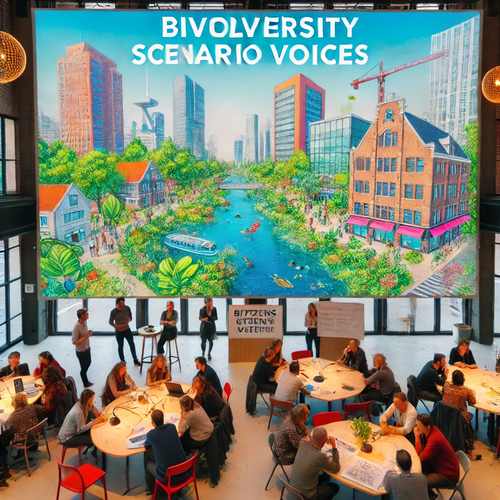
Theme: resilient cities
‘Citizens have a lot of local and experimental knowledge of how they experience the city and their neighborhoods that is very often invisible for decision makers’
‘For residents,“green is green”–little knowledge about (urgency) of biodiversity, residents feel other, more socio- economic urgencies’
‘Where and when citizens want to do something with biodiversity, they find it complicated to make decisions’
With rapid urbanization, maintaining biodiversity in cities has become increasingly challenging. The decline in biodiversity poses significant risks to ecosystems and human well-being. With the increasing attention on the climate crisis, municipalities like Rotterdam are taking measures to strengthen biodiversity, recognizing its vital role in urban resilience. However, roughly 60% of urban environments are privately owned, posing a challenge for traditional monitoring efforts.
The issue
Despite efforts to engage citizens in biodiversity monitoring, many residents perceive biodiversity as distant and complex, leading to low participation rates. Moreover, those who do engage often have limited roles as data collectors, lacking opportunities to take meaningful action based on their observations.
Workshop aim:
The aim of the workshop is to explore the two platforms that empower citizens to become active participants in biodiversity conservation rather than mere data collectors. By shifting the role of citizens from human sensors to decision-makers, the workshop seeked to address the challenge of low engagement and foster greater citizen ownership over local biodiversity.
Solution
The workshop introduced the Biodiversity Citizen Voices (BioCiVo) platform developed by TU Delft, which allows residents to evaluate and design scenarios for improving biodiversity in their neighborhoods. Participants had the opportunity to test the prototype platform and discussed its potential applications in enhancing citizen engagement. Also, the platform Citizens meet Climate (CmC) was tested at the workshop. This platform informs citizens about climate change, connects citizens to actions and listens to citizens experiences in order to gather climate data, personal storytelling and customization.
This research represents a novel approach to citizen engagement in biodiversity conservation, offering a shift from passive data collection to active participation. By empowering citizens to co-design biodiversity interventions, the workshop contributes to building more resilient and sustainable urban ecosystems.
Practical applications:
The workshop outcomes will inform policymakers and urban planners about effective strategies for engaging citizens in biodiversity conservation efforts. The insights gained will support the development of policies and initiatives aimed at fostering greater citizen involvement in urban sustainability projects.
The BioCiVo platform is part of the broader 'Neighborhood as a Biotope' program, funded by the Resilient Delta Initiative. The workshop will utilize a participatory approach, inviting participants to share their experiences and insights, thereby enriching the discussion on citizen engagement strategies.